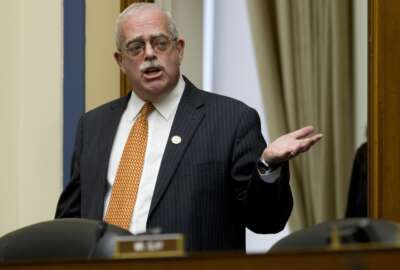
HHS considering limits on telework, NTEU says
The Department of Health and Human Services is considering a new proposal that would limit HHS employees to one day of telework a week, according to the National...
The Department of Health and Human Services is the latest agency to consider changes to its telework program this year, according to the National Treasury Employees Union.
NTEU, which has been locked in a series of contentious bargaining negotiations with HHS for months, said the department presented the union with a proposal that would limit the number of days its employees could telework.
HHS employees will be expected to report to their official worksite for a minimum of four days a week, according to the agency’s proposal, which NTEU shared with Federal News Network.
“For employees on a compressed work schedule, the employee’s regular day(s) off will count as a day away from the official worksite for the purpose of this requirement,” the proposal reads. “The employer may approve deviations from this minimum weekly requirement for days at the official worksite and duty station, but any such deviations shall be at the sole discretion of the employer. In addition, the employer reserves the right to require more frequent days at the official worksite and duty station and to recall employees without prior notification from scheduled telework days for situations deemed appropriate by the employer.”
An HHS spokeswoman disputed the agency was considering substantial changes to the program.
“HHS is not proposing to eliminate or reduce telework,” the spokeswoman said. “Instead, HHS is setting the expectation that management has the right to make the determination of the appropriate workplace structure based on the need for efficiency and effectiveness.”
Both HHS and the union have until Friday to submit their final bargaining offers, NTEU National President Tony Reardon said Monday in an email. But he said he isn’t optimistic that the agency will listen to the union’s concerns after the way the two parties’ previous negotiations ended.
“The agency’s bargaining team generally refused to be in the same room with their employees’ representatives,” Reardon said. “Instead, the mediator shuttled back and forth between the negotiating teams. I found this tactic especially disrespectful and, ultimately, unhelpful.”
The union’s existing collective bargaining agreement with NTEU makes no mention of a specific number of days that employees must spend in the office.
“The parties anticipate that this program will result in increased productivity, improvements in employee morale, job satisfaction and reduced absenteeism,” the 2014 document reads. “Participation in telework is not an entitlement nor is it an accommodation for dependent/family care. The employer will identify barriers to implementing telework and take action to increase the opportunities for employees in suitable positions to participate in the program.”
The new proposal makes no mention of the perceived benefits of telework, as described by the parties’ previous agreement.
“Participation in telework is not an entitlement,” the new proposal reads. “Rather, it is a privilege earned and maintained by employees.”
According to the new proposal, HHS can terminate, suspend or change an employee’s participation in telework if the employee isn’t meeting the program’s criteria, isn’t accurately reporting time worked or isn’t responding to work needs. In addition, HHS can alter an employee’s participation for “business reasons, operational demands or other mission related needs,” the proposal reads.
The existing CBA specifies HHS will notify employees seven days in advance of any changes to a telework agreement and 60 days prior notice if the agreement is canceled or terminated.
“All these years, HHS has never reported problems with the agency’s carefully managed telework program, and now they suddenly want to abolish it,” Reardon said Friday in a statement.
Nearly 16,000 HHS employees — or 19 percent of the agency’s workforce — teleworked three days or more in fiscal 2016, according to the most recent Office of Personnel Management data available. Roughly 13 percent, 11,366 employees, teleworked one-to-two days a week, while 17 percent, or 14,296 employees, used telework on a situational basis.
HHS is the latest federal agency to propose reductions to its telework program. The Education Department in May told employees it would require them to spend at least four days a week in the office. The announcement came after Education removed articles on telework from a collective bargaining agreement with the American Federation of Government Employees.
The Agriculture Department similarly called for employees to limit telework to one day a week.
HHS and NTEU have been locked in heated bargaining discussions over the past year. Both parties had spent the past two weeks discussing new bargaining proposals with help from a federal mediator, which the Federal Services Impasse Panel ordered after HHS had declared an impasse in negotiations over the summer.
NTEU has said it approached HHS about reopening its contract back in July 2015. The two parties spent two years negotiating the ground rules for contract discussions but couldn’t agree. The union took the case to the Federal Service Impasses Panel, a body of presidentially-appointed members who resolve labor-management disputes. The panel imposed ground rules on HHS and NTEU, but the union said the negotiation process stalled.
But the president’s May 25 executive orders on collective bargaining and official time revived negotiations. HHS in June offered bargaining proposals to NTEU, which originally excluded previously-agreed-to articles in NTEU’s current contract and detailed negotiated policies on telework, alternative work schedules, transit subsidies, performance awards and appraisals and reassignments and details.
NTEU offered up its own proposals this summer. Both parties have met a few times briefly in July before HHS made a final offer, according to the union. When the parties couldn’t agree, another impasse was declared.
Several lawmakers have called on HHS Secretary Alex Azar to drop the impasse and encourage the agency’s negotiators to engage in “good faith bargaining” with NTEU.
Sen. Kamala Harris (D-Calif.) is the latest senator to express her concerns and urged Azar in a Dec. 13 letter to reconsider the agency’s negotiating tactics.
Copyright © 2025 Federal News Network. All rights reserved. This website is not intended for users located within the European Economic Area.
Nicole Ogrysko is a reporter for Federal News Network focusing on the federal workforce and federal pay and benefits.
Follow @nogryskoWFED






